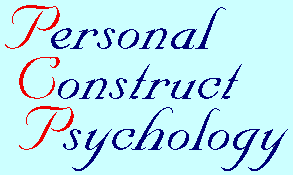
Introduction to PCP
Personal construct psychology is a constructivist system of psychology developed by George Kelly and expounded in his two-volume work: Principles of Personal Construct Psychology (New York: Norton, 1955).
Kelly was a clinical psychologist and educator, and the primary impact of his work initially was in psychotherapy and education. However, PCP presents a complete psychological system, and it has come to be widely used in management studies, knowledge modeling in artificial intelligence, and in a wide range of other disciplines. It has a rich literature in books and journals, and the PCP community runs a biennial international conference, operates a journal, and publishes newsletters from a number of PCP societies in different regions internationally.
Kelly was a keen geometer with experience in navigation and an interest in multi-dimensional geometry. When he came to formalize his theory he took as his model Euclid's Elements and axiomatized personal construct psychology as a fundamental postulate together with eleven corollaries, terming the primitives involves elements and constructs.
Kelly's fundamental postulate for personal construct psychology was that:
A person's processes are psychologically channelized by the way in which he anticipates events. (Kelly, 1955, p.46)
He saw all people as personal scientists engaged in anticipating the world. His first corollary, the construction corollary, states:
A person anticipates events by construing their replications. (p.50)
This emphasis on the role in behavior of a view to the future is what distinguishes Kelly's approach to psychology. He saw anticipatory processes as the source of all psychological phenomena:
A person's processes, psychologically speaking, slip into the grooves which are cut out by the mechanisms he adopts for realizing his objectives. (p.49)
These grooves provide templets for construing events which he termed personal constructs:
Man looks at his world through transparent templets which he creates and then attempts to fit over the realities of which the world is composed. (pp.8-9) Constructs are used for predictions of things to come, and the world keeps on rolling on and revealing these predictions to be either correct or misleading. This fact provides the basis for the revision of constructs and, eventually, of whole construct systems. (p.14)
Kelly's clinical approach was based on constructive alternativism, on encouraging the client to develop alternative constructs systems through which to construe life events.
The paper Kelly's geometry of psychological Space provides a historic overview of Kelly's work and its links to developments in psychology and intensional logic. The paper Personal construct psychology and the cognitive revolution provides a background to Kelly's intellectual development.
WebGrid lets you experiment with Kelly's repertory grid technique for eliciting and analyzing personal construct systems implemented as a service on the World Wide Web.
PCP List Servers
There is an email list server for discussion of all issues relating to personal construct psychology:
The archives of mail to the list server in since September 1998, and facilities for joining it, are available at http://JISCMAIL.ac.uk/lists/pcp.html.
There is also an associated email list server for discussion of all issues relating to computer-based tools supporting personal construct psychology:
The archives of mail to the list server in since June 2004, and facilities for joining it, are available at http://JISCMAIL.ac.uk/lists/pcptools.html.
Related Web Sites
- Rep Plus: Conceptual Modelling Tools downloads
- Jörn Scheer's Kelly Society portal is the best source of up-to-date information about PCP meetings, web sites, tools, etc
PCP Publications
Papers by Mildred Shaw and Brian Gaines may be found can be found at http://cpsc.ucalgary.ca/~gaines/reports/.
Papers by John Boose and Jeff Bradshaw are available at http://cpsc.ucalgary.ca/~gaines/BooseBradshaw/ in Microsoft Word format.
Personal Construct Theory & Practice (e-journal)
This e-journal provides the opportunity to publish papers on personal construct theory as well as its applications in a variety of disciplines such as psychotherapy, organisations, business, education, social work. It is also a forum for practitioners in the various professions involved. Papers from related disciplines are also welcome. Manuscripts will be peer-refereed so that the level of quality will be comparable to that of other journals.The journal may be accessed through its web site.
Journal of Constructivist Psychology
Psychology and related disciplines in the human sciences have been revolutionized by both technical advances in the study of knowing systems, and a postmodern emphasis on the role of language, discourse, and personal knowledge in the construction of social realities. The Journal of Constructivist Psychology is the first publication to provide a professional forum for this emerging focus, embracing such diverse expressions of constructivism as personal construct theory, structural-developmental and social constructionist approaches, constructivist family therapy, and narrative psychology.
Individuals interested in submitting (APA style) manuscripts or desiring more information are encouraged to contact Dr Robert A. Neimeyer, Dept. of Psychology, University of Memphis, Memphis, TN, 38152, USA (b.neimeyer@mail.psyc.memphis.edu).
Information about subscriptions, etc, may be obtained through the publisher's web site.